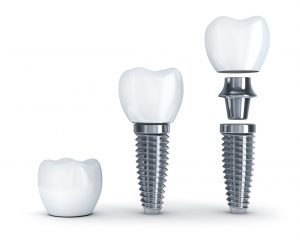 Many people think of missing teeth as purely a cosmetic issue. In reality, however, even a single missing tooth can lead to serious health problems. Dental implants in Norwalk are, for many patients, the best solution to this common condition.
Many people think of missing teeth as purely a cosmetic issue. In reality, however, even a single missing tooth can lead to serious health problems. Dental implants in Norwalk are, for many patients, the best solution to this common condition.
Why Even a Single Missing Tooth is Cause for Concern
Look at a row of human teeth and you’ll probably notice how close each tooth is to the adjoining one. This is part of what gives your jaw such enormous strength. In fact, researchers have estimated that the average human can exert more than 200 pounds of pressure per square inch.
This fact is more than an interesting tidbit. It’s what enables you to eat a wide variety of healthy foods throughout your life. It also plays a key role in functions such as speaking, singing, and other important aspects of human communication.
This magnificent natural arrangement does have its limitations, however. Like a row of dominoes, even a single missing tooth can cause repercussions throughout the whole system. Here’s how:
- When a tooth is missing, those on either side of the gap are subjected to unnatural side-to-side pressure. Over time, this can cause more teeth to loosen and fall out.
- The gap left behind by a missing tooth can become a gathering spot for decay-causing bacteria, putting the person at greater risk for cavities and gum disease.
- As more teeth are lost, the alignment between the upper and lower jaw may deteriorate. This can cause a variety of health problems, including headaches and back or neck pain.
Dental science has developed several ways to address these problems. These include crowns, bridges, and dentures. But, while each of these approaches has its benefits, all of them have serious drawbacks. This is why most dentists recommend implants as the best long-term solution for missing teeth.
Four Reasons Why Implants are the Best Form of Restoration
Dental implants stand apart from other types of tooth restoration in the following key ways:
- At the heart of every implant is a lightweight yet ultra-strong titanium post, similar to the root of your natural teeth. This gives each implant remarkable strength.
- Unlike traditional dentures, implants require no messy adhesives. Unlike crowns and bridges, they need no dental cement to stay in place. They will never compromise your ability to eat or speak. They will never cause you embarrassment.
- Dental implants require only the same type of care you give to your natural teeth. This includes brushing and flossing, eating a sensible diet, and seeing your dentist for regular exams and cleanings.
- Dental implants are indistinguishable from healthy natural teeth. The only way someone could know that you have implants is by running a scan of your mouth with an x-ray machine.
Only your dentist in Norwalk can tell you which type of dental restoration is best in your case. Talk to him or her about your options during your next appointment. For many people, dental implants are the key to a restored smile and a healthier life.
About the Author
Dr. Norman C. Sommers has been practicing dentistry here in Norwalk for more than 20 years. Dr. Sommers earned his DDS degree from the Ohio State University and is certified in implant placement and procedures. You can reach his office online or by calling (419) 668-3606.


